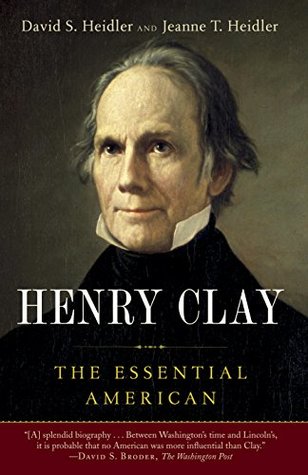Today I'm looking at a biography of Henry Clay, one of the most prominent statesmen of the early American Republic. With John C. Calhoun and Daniel Webster, Henry Clay formed a triumvirate that represented the political and sectional differences of the United States. For nearly forty years they held positions of high office in the United States and held the country together. When the three giants died in the early 1850's, America was aware that it was the end of an age and it would only be a few years until the Slaveholders' Rebellion would tear the nation apart. But even in his dying days Clay labored to keep the country together.
Clay had a long and varied career, serving in the House of Representatives, becoming Speaker, being a commissioner in Ghent that formed the treaty that ended the War of 1812, Secretary of State, and finally Senator. Clay left an indelible mark on the United States both metaphorically and very literally with actions such as the Missouri Compromise of 1820. Clay's most enduring power was to marshal votes, create majorities, and form a consensus despite the incredibly fluid nature of American politics. Despite there being only one or two political parties during Clay's lifetime a person's political ideas were less likely to be dependent on party and more likely to depend on geographic location and economic background. So it was probably easier for Clay to form bipartisan measures in his era than in our own.
Clay's most enduring project was what he called the American System, a program that would promote American development through a variety of measures. Specifically Clay advocated for a protective tariff to stimulate American industry, internal improvements including canals, roads, and later railroads to stimulate trade, and a central bank to ensure a stable currency. Clay made some progress with at least the tariff and funding internal improvements but due to the rise of Jacksonian democracy Clay never succeeded in creating a central bank and reforms to banking would have to wait until Salmon P. Chase's tenure as Secretary of the Treasury.
I think the most frustrating thing about Henry Clay is he spent a lifetime perched on the fence in regards to slavery and perhaps no other person than Clay personally represented the dilemma America faced. Clay owned slaves and personally detested the institution of slavery, but also opposed the platform of abolition and immediate emancipation. Clay spent a lifetime as president of the American Colonization Society, an organization that sought to neatly solve the problem of slavery by gradually emancipating slaves and sending them back to somewhere in Africa and completely sidestepping the issue of racial relations in the United States. Colonization as a plan was never practical for a variety of problems. First, colonization never attracted sufficient money to emancipate and transport slaves in any practical means, so it remained a minor solution at best. Second, the timeline for emancipation and colonization was theoretical at best, inevitably pushing the problem to some later date when increases in population would make slavery unnecessary. Finally, colonization never took the opinions of the slaves themselves into consideration either. African-Americans, all of whom at this point were born in America, knew nothing about Africa and had no desire to be sent there and they had no desire to be sent anywhere else. The Colonization Society perfectly matched Clay's attitudes on slavery, an attempt to ignore the problem and hope to solve it at some later date while it grew to be a problem that almost tore the country apart.
Clay is an interesting individual and was at the center of every political issue during the first half of the nineteenth century, even with his individual failings. If you seek to understand politics of the early Republic and the antebellum era, this is an excellent book to read.
- Kalpar


No comments:
Post a Comment